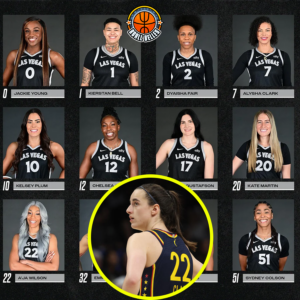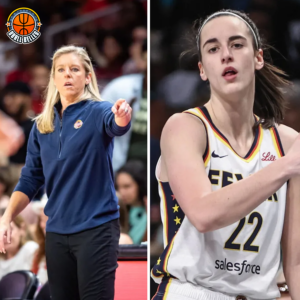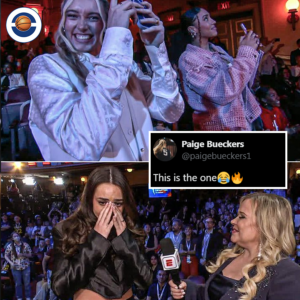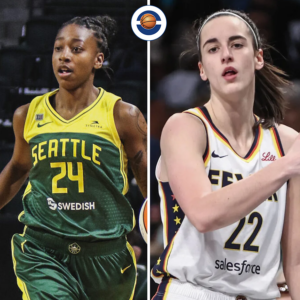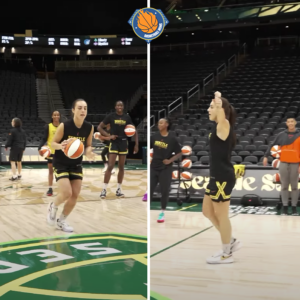Nike has been under the spotlight lately due to the mixed reactions surrounding its new USA track and field uniform. Despite efforts to enhance the Olympic atmosphere, the brand has faced some criticism. The recent release of Caitlin Clark’s shoe deal has intensified scrutiny on Nike, with concerns raised about echoes of disrespect towards legends. This controversy adds a fresh twist to the ongoing debate, particularly as it coincides with Sha’Carri Richardson’s involvement in Nike’s ad campaigns.
The discussion sparked on Twitter after reports surfaced that Caitlin Clark, a star player for the Indiana Fever, is on the verge of signing a lucrative eight-figure deal with Nike, including her own signature shoe. Simultaneously, users expressed frustration over A’ja Wilson, a prominent WNBA star, not having her own signature shoe despite her impressive accomplishments.
One user voiced their discontent about Nike’s treatment of Richardson, stating, “They doing after the fact shit wit ShaCarri too smh.” Another pointed out Nike’s track record of neglecting black women athletes, except for figures like Serena Williams.
Nike’s recent controversial moves, including its ad featuring Richardson and the release of Clark’s shoe line, have stirred debate among fans. Clark’s anticipated signature shoe deal follows in the footsteps of WNBA stars like Sabrina Ionescu and Elena Delle Donne.
Nike also faced criticism for its unveiling of statues honoring sports icons like LeBron James, Sha’Carri Richardson, and Kylian Mbappé, while omitting track and field legend Shelly-Ann Fraser-Pryce. The brand’s partnership with Richardson in a Whoop ad drew comparisons to a 2023 ad featuring Shelly-Ann Fraser-Pryce for Richard Mille.
The controversy surrounding Nike’s 2024 Paris Summer Olympics track uniforms for women, particularly the high-cut bikini line unitard, has also sparked dissent and ongoing uproar. While some athletes supported the uniforms, others, like Tara Davis-Woodhall and Lauren Fleshman, openly rejected them. Dwayne Johnson also voiced opposition to Nike’s attire choice for Team USA.
These incidents have reignited discussions about respect for legends and the company’s marketing decisions. As the debate continues, Nike faces the challenge of balancing innovation and inclusivity, especially when representing iconic figures in sports.
News
“Troubled” Clark and Her $20 Million Nike Deal Called into Question as Aces’ Owner Faces WNBA Funding Probe
The Las Vegas Aces are the two-time defending champs but they have taken a backseat to the Indiana Fever due to Caitlin Clark’s arrival in the WNBA. The Fever made the former Iowa superstar the No. 1 pick in this year’s…
Caitlin Had to Sit on the Bench while ‘In Good form’ because of Her own Mistaken Decision, which Led to Heavy Criticism of Her coach. Is this Considered ‘Personal Vendetta’?
Caitlin Clark and the Indiana Fever suffered their fifth loss of the season, in their fifth game. Clark and the Fever haven’t been able to connect the dots to claw out a victory. They started the season getting blown out by…
“True Friendship” Nika Muhl has always received Support from Former Teammate Paige Bueckers since the Early Days of WNBA “This is the one”. I don’t expect them to be “Competitors” in the future.
Paige Bueckers is following the journey of all her ex-UConn Huskies teammates, who have taken steps into the WNBA. She took to X to share league rookie Nika Muhl’s edgy outfit she chose to wear in the tunnel before a…
Jewell Loyd – Caitlin’s opponent, sent her four messages after the Fever vs. Storm game just took place and the Fever lost five games in a row: “Everyone’s journey is different.”
Not many would understand the pressure that Caitlin Clark feels at any given moment. However, another first-round pick can certainly try to. Although pressing the fact that everyone’s journey in the W is different, Jewell Loyd still shares what her rookie year was like….
Astounding!!! Nika Muhl’s mid-court shot before the Seattle Storm vs Minnesota Lynx game had everyone “gasping”. This is why, despite encountering “unplayable” troubles earlier, Nika always finds a spot in the starting lineup???
Nika Muhl has become a women’s basketball fan favorite over the past two months. While the Croatian guard was already popular among UConn fans during her NCAA tenure, Muhl’s excellent defense against Caitlin Clark during the 2024 NCAA tournament made fans fall…
End of content
No more pages to load
